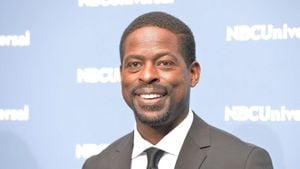Diplomatic efforts surrounding the Ukraine-Russia war have intensified, particularly with the reascension of US President Donald Trump. Despite relentless attacks between Russia and Ukraine, Trump’s return to the political forefront has galvanized pressure on both nations to pursue peace negotiations. But is it enough to end the brutal conflict?
Ukrainian President Volodymyr Zelensky has been vocal about the necessity of including Ukraine in any discussions aimed at ending the war. During a recent press conference, he expressed, "Any talks held without Kyiv would not guarantee lasting peace." His comments reflect the increasing urgency for collaborative efforts to establish meaningful dialogue and potential resolutions to the conflict.
At the same press conference alongside President Maia Sandu of Moldova, Zelensky reiterated the importance of engaging Europe and the US as key players. He stated, "I hope Ukraine will be there, America, Europe, and the Russians,” underlining Ukraine’s indispensable role. The stakes are rising as Zelensky remarked on Ukraine’s significant contribution to any lasting agreement, emphasizing, "It is impossible to exclude Ukraine from any negotiation platform, or this negotiation platform will not have real results."
This rhetoric coincides with Trump's recent declarations, positioning him as potentially pivotal to extinguish the flames of the almost three-year-long conflict. Trump has promised, somewhat controversially, he could end the war "within 24 hours" upon taking office, though aides have clarified this process might extend for months instead. Trump has shown hope for dialogue with Russian President Vladimir Putin, indicating he could meet him immediately to discuss the situation.
Meanwhile, Putin recently voiced his willingness to negotiate, describing Trump as a "smart" leader. The Kremlin, nevertheless, is still awaiting guidelines from Washington to proceed, demonstrating the complexity and hesitance surrounding such negotiations, which many see as pivotal.
Addressing the humanitarian crises exacerbated by the conflict, Zelensky offered to assist Moldova, currently grappling with severe power shortages due to disrupted energy supplies. Ukraine is prepared to send coal to stabilize Moldova’s energy situation, which has been severely crippled by the war, affecting regions like Transnistria with limited energy resources. He highlighted how Ukraine's support for Moldova is intrinsically linked to Ukrainian security.
"The absence of a crisis in Moldova is also (in the interests of) our Ukrainian security," he noted, illustrating the broader interplay of regional stability and solidarity among neighboring nations impacted by Russian aggression.
Trump's re-engagement has left many observers questioning whether this new chapter could influence the war's outcome. Zelensky remains cautious but hopeful, stating, "I do believe if anyone can do it, it's him." His sentiments reflect not only the encapsulated hope for resolution but also the looming dread of continued violence if negotiations falter.
Yet, the clear stance from Zelensky emphasizes the overarching need for inclusion and collaboration to facilitate meaningful discussions. "We should focus on this today," he remarked, hinting at the urgency required to transition from conflict to favourable outcomes through dialogue.
Despite repeated calls for peace, the reality remains turbulent, as both Russia’s aspirations and Ukraine’s desperate search for security collide within international forums. The shape and structure of upcoming negotiations remain hazy; at this juncture, the world watches closely as power players navigate these treacherous waters.



